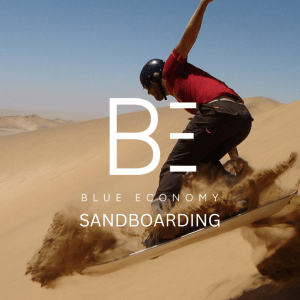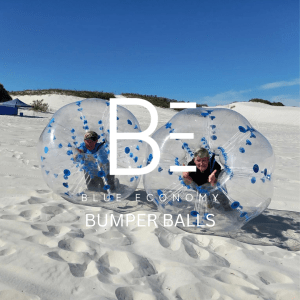Why
Blue Economy

The Blue Economy – Oceans of Opportunities.
The Blue Economy with emphasis on Ocean and Coastal Economy is the new global phenomenon with vast new job and entrepreneurial opportunities.
According to the World Bank the Blue Economy is “the sustainable use of ocean resources for economic growth, improved livelihoods, and jobs while preserving the health of the ocean ecosystem.” The Commonwealth of Nations considers it “an emerging concept which encourages better stewardship of our ocean or “blue” resources”.
South-Africa has a coastline of 3 900km with an exclusive economic zone of 1.5 million square km more than the land mass of 1.2 million square km. The Blue Economy has a potential to contribute up to R177 billion to the South-African GDP by 2033 and create over one million jobs as well as transformation and greater inclusion and opportunities for SMME’s. Over 30 000 vessels pass South-Africa’s coast on an annual basis with 13 000 docking in our ports. Around 80 oil rigs are estimated to be in range of the Western Cape alone offering significant potential for repairs in our ports. 300 million tonnes of cargo and 1.2 million tonnes of liquid fuel are transported along South-Africa’s coast.
(Cape Oceans Economy Final Report 2020) “The Maritime Economy is sometimes used interchangeably with Oceans Economy. Globally, the term Blue Economy is used to describe inherently principles of sustainability and inclusion (like the Green Economy). Sectors focused on is offshore renewable energy, marine biotechnology and bioprospecting, sustainable fisheries, desalination, marine ecosystem services, waste disposal management.”
The focus areas and enablers of the Blue Economy are: Marine Transport, Offshore Gas, Aquaculture, Marine Protection Services and Ocean Governance, Small Harbours Development, Ocean, Coastal and Gastronomy Tourism
Blue Economy is a term in economics relating to exploitation, preservation, and regeneration of the environment. Its scope of interpretation varies but in general it suggests a sustainable development approach to Coastal resources.
It is also important in this context to define the Green Economy. The Green Economy is defined as an economy that aims at reducing environmental risks, and that aims for sustainable development without degrading the environment. Therefore, the Blue Economy is a part of the Green Economy. During the Rio+20 Summit the delegates declared that “a green economy was in fact a blue economy”.
Based on stakeholder engagement the below opportunities have been identified:
- Coastal and Marine Tourism product and route development, including cruise and superyacht related opportunities, ocean sports, high end customised experiences, nature-based tourism, boat-based activities, lifestyle tourism, aquaculture tourism, ocean, and lagoon sports (although noting seasonality challenges).
- Expanded manufacturing of large leisure boats, cata
- Private sector investment into small harbours in partnership with local commu
- Ship / boat repair and maintenance, including potential refurbishments related to new technolo
- Jobs related to marine protection and patrol services, lifesaving, monitoring / Enforcement, anti-poaching, and res
- Ocean sports related manufacturing (sustainable boards).
- Maritime education as an economic opportunity, including attracting international student
- Expanded aquaculture production and processing: mussels, oysters, finfi
In developing the framework for the Blue Economy, it is vital to include Skills Development and Career pathing. As the Blue Economy is the new Tomorrow as globally recognised the growth must be harnessed in a way that is sustainable and delivers robust economic development.
The
Curriculum

To those who stay put, the world is but an imaginary place. But to the movers, the makers and the shakers, the world is all around, an endless invitation. Travel is the most intense mode of learning.
Ocean, Coastal and Gastronomy Tourism is ranked amongst the top four sub sectors of the country’s maritime economic sector projected with phenomenal growth and seen as the new Global phenomenon in economic development.
The aim of this 8-week programme is to students with a once in a lifetime experience by combining academic knowledge of Tour Guiding, Personal Development and Entrepreneurship skills with Outdoor Based Activities and Adventures to prosper to the next stage of their lives. The programme will ensure that young adults grow into an adventurous profession following their passion in life as a career. Students will also gain specialist Knowledge on Ocean, Coastal and Gastronomy Economy and Tourism supporting the Blue Economy and its vast possibilities worldwide. The programme will give guidance to delegates on innovative, alternative opportunities and will recommend career paths and professional development needed.
Be on holiday for the rest of your life! Help tourists navigate through unfamiliar territories, discover their souls, and bridge their boundaries and fears. Become an ambassador of your region, be the first to welcome tourists and be the last to bid them farewell.
“A skilled tourist guide can transform a simple tour into an enlightening journey, igniting curiosity and fostering a sense of wonder in those who explore with them.” World Federation of Tourist Guide Association.
“A great tourist guide not only shows you the sights but opens the doors to hidden gems and local secrets, creating deeper connection to the place you are visiting” Unknown
The programme is specially developed and structured to include in the 8-weeks a full set of Adventure and outdoor activities, Soft Skills Training, Leadership and Entrepreneurship activities. Learners will complete the CATHSSETA Accredited NQF Level 4 Qualification in Cultural Guiding ID TG/CULTSITEGD/4/0031 to enable them to work as a Tour guide and earn an income in doing what they love. Included in the program is a First Aid Level 1 course. With this qualification you will be able to register at the Department of Tourism as a Cultural Tour guide. Students will also be assisted to get in contact with Tour Operators, International Tour Guides and Funding specialists should they want to start their own business.
The programme has an intensive curriculum to equip the candidates not only with Tourism knowledge but also international best practices from other countries that is ahead of South Africa in growing the Blue Economy, entrepreneurship training, mentoring, and coaching and providing a platform for networking with various businesses and industry champions.
The programme will provide tailored training for delegates in both basic and advanced Blue Economy knowledge and outcomes but more specific on Ocean, Coastal and Gastronomy Tourism. It will also enable knowledge and technology transfers from abroad and create new high value-added jobs.
The design of the programme ensures an integrated plan and fast track implementation through knowledge of Tourism in general and requirements for Ocean, Coastal and Gastronomy tourism packages. South Africa is surrounded by oceans, have an immense rich culture and opportunity for adventure, cultural, wildlife and Food tourism and yet we have not structured this to take advantage of this potential. During the programme learners will gain knowledge of all the enablers of the Blue Economy in either specialist guest lecturers and excursions to experience the true value of these enablers and career paths.
Our model and approach are focused to assist students in developing products and services linked to the Ocean, Coastal and Gastronomy Economy (national and international) and connect learners and SMMEs with corporate entities, government, Local and International Tour Operators and International Focus Groups actively involved in the Blue Economy.
The





Blue Economy




The participants will follow the CATHSSETA accredited Skills Programme in Cultural Site Guide TG/CULTSITEGD/4/0031NQF level 4. The qualification will pave the way to a prosperous career and/or entrepreneurship opportunities in Cultural and Adventure Guiding for all participants.
It comprises of 6 Knowledge modules and 1 workplace components. On completion the participant will be able to promote and develop tourism activities and assess current and future tourism opportunities. The participants will be able to structure and execute tourism packages, open doors to hidden gems and local secrets, creating a deeper connection to the place the tourists are visiting.
DQSS CAN SUPPLY POSITIONS FOR THE FOLLOWING INDUSTRIES
Blue Economy
- Lifting Machine Operators
- Crane Operators
- Stevedoring
- Gangway
- Maritime logistics
- Supply Chain
- Freight Handling
- Maritime Engineering
- Naval Architect
- Oceanographers
- Marine Biologist
- Divers
- Driller
- Rigger
- Boat Builder
- Ship and Boat Maintenance Shipfitter
- Shipwright
- Broker
- Aqua culturist
- Fisheries
- Renewable energy
- Sustainable wastage
- Customs
- Marine Protection



Hospitality and Tourism
- Travel Processor
- Travel Agent
- Travel Consultant
- Reservation Manager
- Travel Professional
- Tour Operator
- Tour Guide
- Lifestyle Tourism
- Crew on cruise liners and yachts
- Chefs
- Fast Food Services
- Food Production
- Barista
- Housekeeping
- Food and Beverage
- Stewards
- Food Safety
- Catering
- Barman
- Mixologist
- Concierge
- Event’s Organiser
- Reception
- Reservations
- Blogger
- Ocean Sports (Specialist}
- Ocean sports-related manufacturing (Boards)



Outdoor




Part of success of this programme is balancing Academics with meaningful adventurous extra-curricular activities and academic tours. This component is where Adventure meets Academics. Students will be taken on highly planned and structured excursions to experience different opportunities but not only for the fun aspect but with a purpose. Every week learners will experience activities within the Blue Economy whether it be mainstream areas of the Blue Economy or local cuisine, natural environment, history, cultural activities or outdoor extreme adventure activities (sandboarding, hiking, surfing, quad biking, horse riding, bumper balls, helicopter ride, etc). All the outdoor adventures and excursions will be planned with within the boundaries of the learner’s abilities and fears.
Personal




Students will be taken on an exciting journey through safe, modern designed psychological activities to critically analyse their thought processes and develop a progressive design thinking approach to interpersonal interaction, learning and reasoning, purpose and strategy and true collective value. Students will obtain self-knowledge on their personal profile to ensure knowledge of their abilities, strengths, and short comings for development. They will be equipped with a clear vision and goals, independence, and emotional intelligence.
The empowerment sessions will ensure a sense of purpose to make informed rational future decisions. The Personal Development component is designed to assist students to gain confidence, adapt to life challenges on an emotionally mature level, gain self-awareness and self-knowledge build or renew identity and self-esteem and fulfil their aspirations.
Careers and the




Organisations within the travel and tourism industry require skilled travel professionals who can render a high-quality service that meets the ever-changing customer needs. Students will be uniquely prepared to the innovation of the Blue Economy trends to be able to meet clients’ needs, research, provide advice and sell travel and tourism related products as well as execute these products.
DQSS is a staffing solutions company, that can supply qualified positions for the following Blue Economy and Hospitality / Tourism industry companies listed in the columns below.

